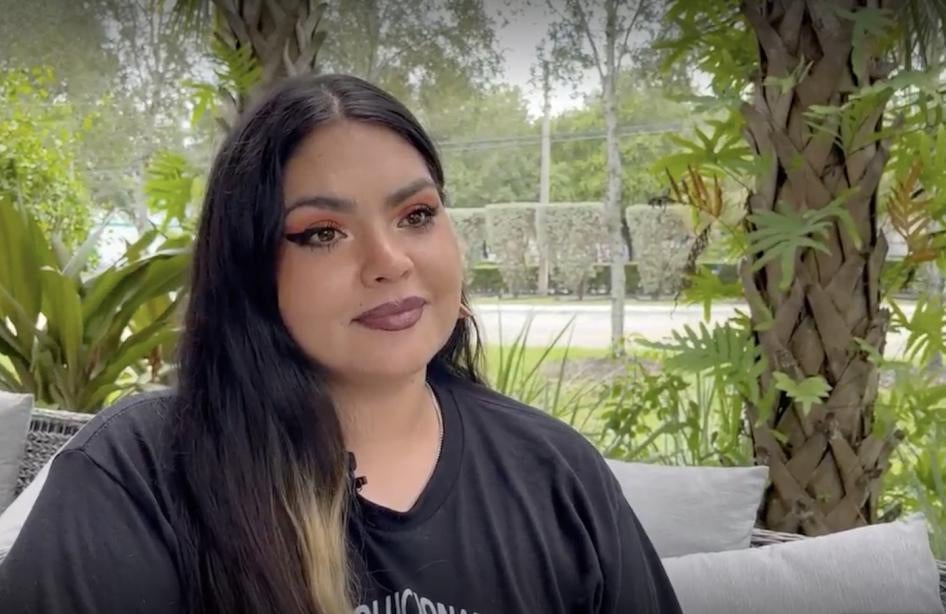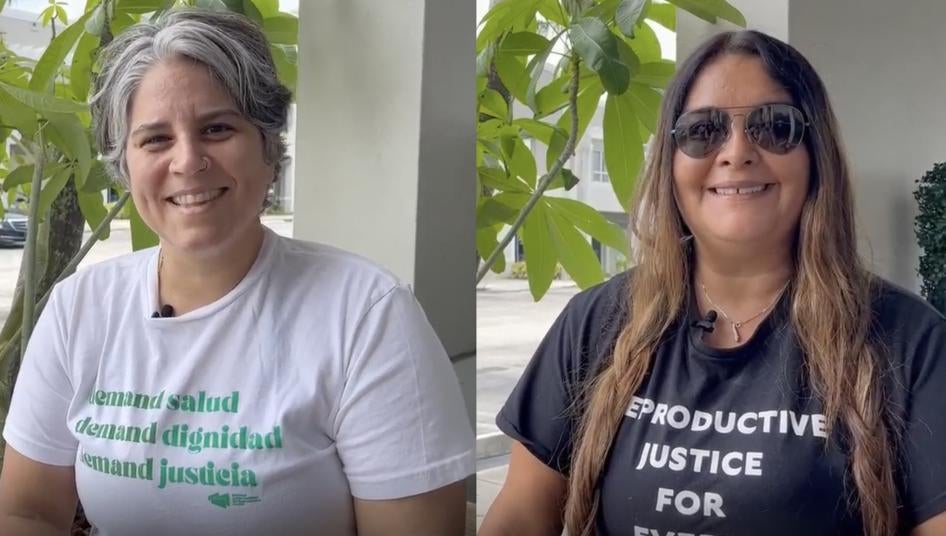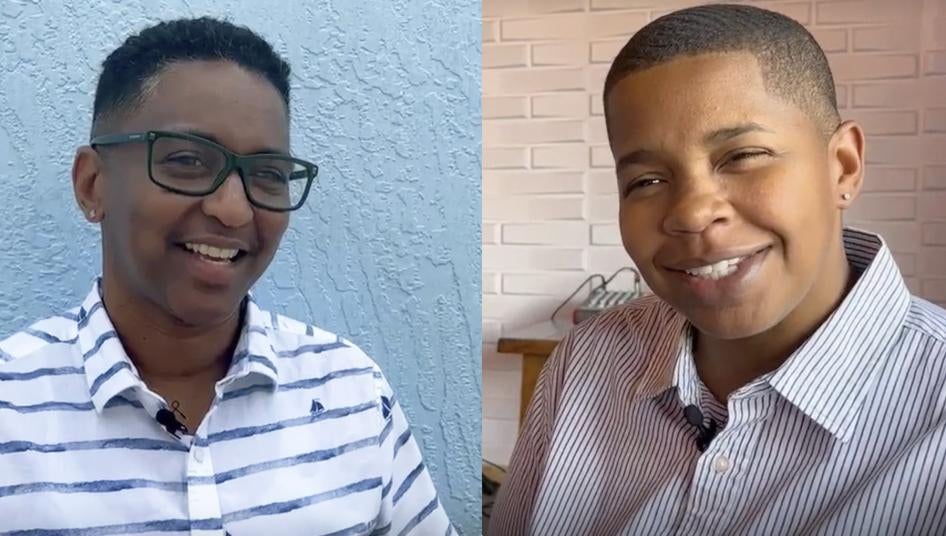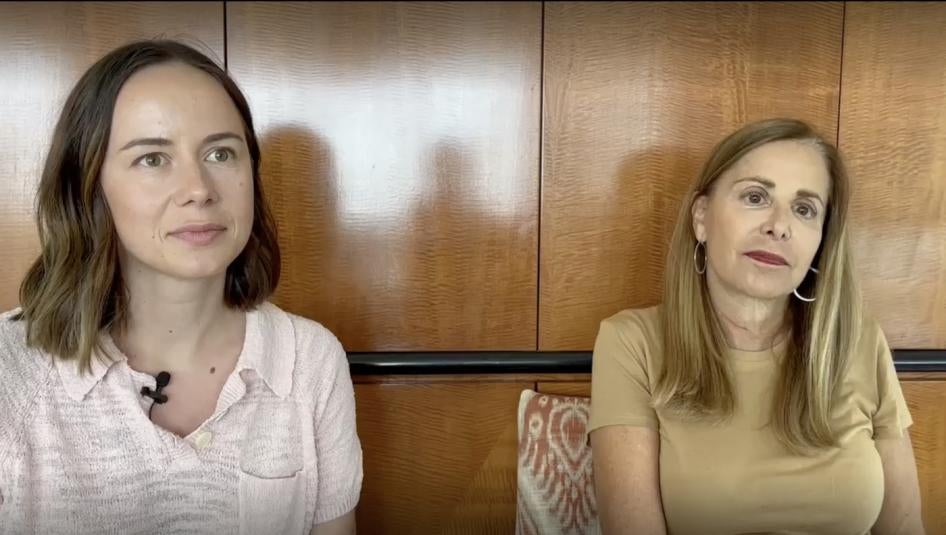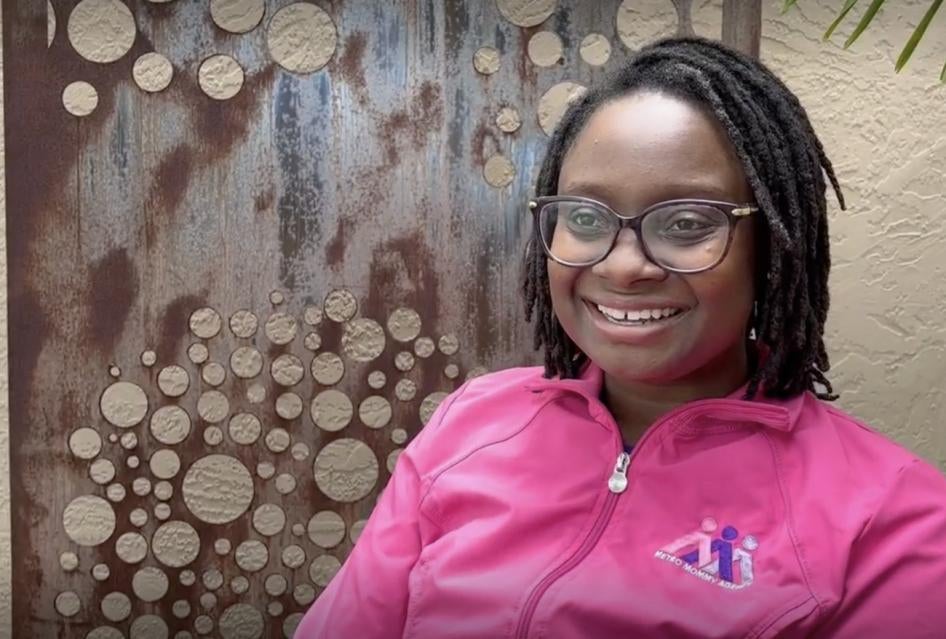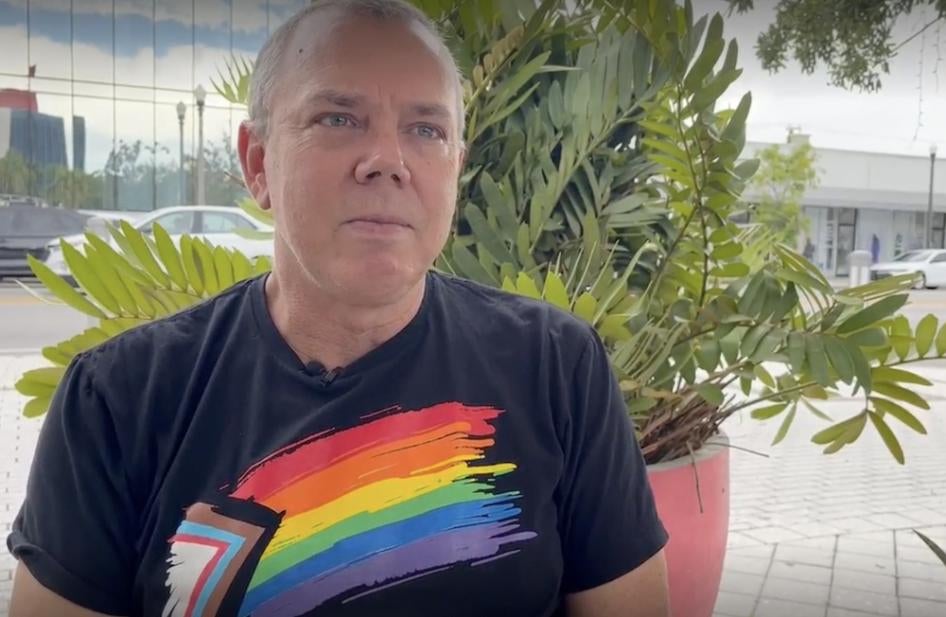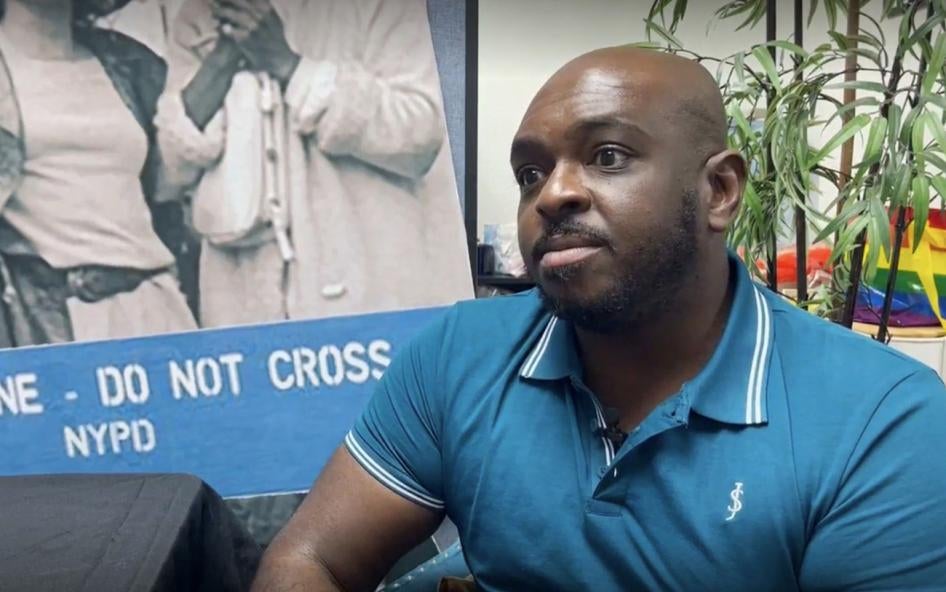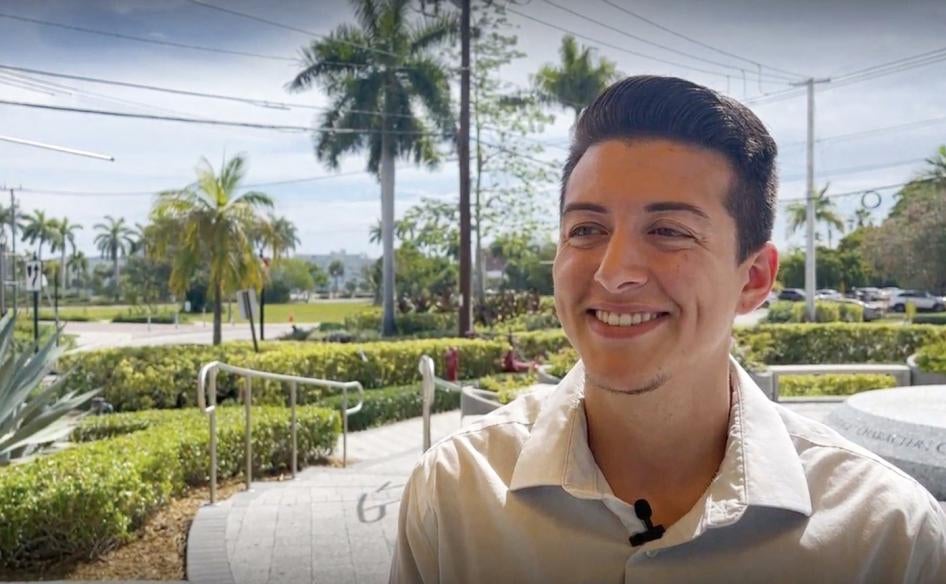Feminist Florida
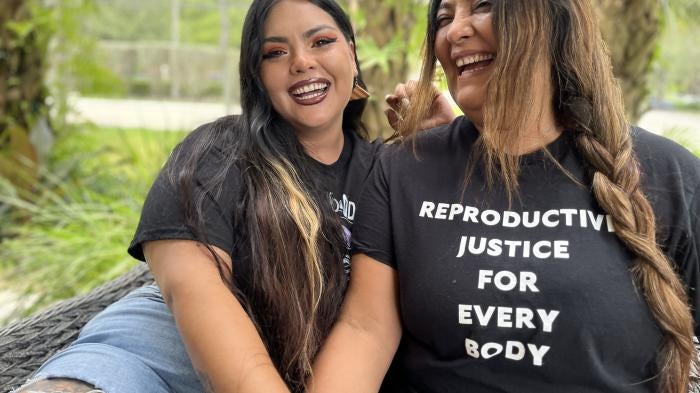
Florida’s leaders have earned a reputation for quashing the rights of women and lesbian, gay, bisexual, and transgender people (LGBT). In 2023 alone, lawmakers expanded the “Don’t Say Gay or Trans” law to ban classroom instruction of sexual orientation and gender identity through the eighth grade; prohibited children from accessing gender affirming care and made that care more difficult for adults to obtain; prohibited trans people from using bathrooms consistent with their gender identity; and sought to restrict drag performance. The state’s most prominent LGBT group – along with the NAACP – issued a “travel advisory,” warning people about Florida’s dangers. It doesn’t stop there. In April, Governor Ron DeSantis signed an extreme 6-week abortion ban, which will disproportionately harm Black people, people of color, and those with lower incomes, among others.
But these policies don’t reflect all of Florida. Human Rights Watch researchers Erin Kilbride and Cristina Quijano Carrasco traveled to Miami to meet with human rights defenders leading the state’s resistance movements around women’s and LGBT rights. This is not, they would learn, a trip to Ron DeSantis’ Florida.
Ysabella Muñoz Osses, Florida Access Network
Our last meeting in Florida was with Ysabella Muñoz Osses, director of advocacy and organizing at Florida Access Network (FAN), the only people of color-led abortion fund in Florida. She is also the daughter of another activist we interviewed, Karen Osses, from the National Latina Institute for Reproductive Justice. Like her mom, Ysabella has been an organizer from a young age, since, while studying in Chile, she participated in student protests against the privatization of the Chilean education system, inherited from Pinochet’s dictatorship.
Legislation has attacked queer, indigenous, Latinx people for a long time. However, when she moved to Florida, Ysabella felt it wasn’t her place to fix a country that wasn’t hers. Today, she understands that migrants too deserve to live in the world they desire and, like everyone else, must be at the center of public policy.
She wants people to understand that public policy can have a direct effect on their lives: “People see what happens in Tallahassee as distant, but we feel the consequences in our flesh, in the decisions we can make about our own body, in the books we read, and the streets we walk.”
Ysabella has found her work at FAN to be a great way to bridge that distance. In addition to covering abortion costs for those who can’t afford it and coordinating practical support like transportation and lodging for abortion seekers, they advocate to bring the voices of Black and Indigenous women to public policy, and have mutual aid initiatives for reproductive health products.
Through this work, Ysabella has also learned that self-care and safety are an important part of activism.
“The reality for a lot of activists is that we can’t just sign off at the end of the day, we are organizing around issues that directly affect us and therefore we must think of strategies to keep ourselves and our communities safe and happy,” she said.
FAN ensures that this is one of the pillars on which the organization stands, regularly holding community events, strategizing to keep their members safe from digital threats, like online harassment, doxing, or hacking.
They also make sure they remain a sex-positive and pleasure-focused organization that understands reproductive justice as the ability of people to build the life that they want.
Karen Osses y Charo Valero, National Latina Institute for Reproductive Justice
When we met with Karen Osses and Charo Valero from the National Latina Institute for Reproductive Justice, we spoke in Spanglish – a combination of English and Spanish that, instead of following traditional grammar structures, is true to the reality of existing between two languages. This is how many conversations go in Miami’s Latinx community.
Charo and Karen come from Panama and Chile respectively and have deep ties to Miami. Both have noticed a lot of fear in the Latinx community. For them, it is critical that activism in Florida is deeply connected to the communities feeling the effects of hostile laws. Charo and Karen are working hard in connecting activism to the everyday life of Latinx immigrants in Miami by informing, organizing, and mobilizing their communities on reproductive justice issues.
One way they do this is through their Poderosas initiative, which promotes leadership through education. Once a month, Karen meets with women in South Florida to talk about a different issue related to reproductive justice.
“Everyone believes that reproductive justice is the power to decide about your body,” she said. “It is, but to be able to make those decisions, it is also necessary to have a living wage, to live in a healthy environment, and to be able to participate in society.”
In other words, reproductive justice is intimately related to economic, labor, climate, and language justice.
The latter is a priority for the Latina Institute. Through their work, Charo has found that language is an essential part of empowerment for a community whose members often feel they don’t belong within the greater US culture.
“If we want to achieve justice, our movement must belong to all people,” Charo said. “If not, how do we get the message out to communities of immigrants with languages that are not your own?”
However, this is an issue that is often neglected, especially in the political arena. The Latina Institute is working on making state governmental proceedings in Tallahassee more accessible to the Latinx community by using interpreters that can bring formal proceedings closer to the communities that feel the effects of legislation on their lives. They are also part of the coalition that is launching an effort to get a constitutional amendment to protect the right to abortion on the 2024 ballot.
These are the initiatives where Charo finds hope. Amidst a demoralizing environment, she’s quick to remember that the majority of people in Florida oppose their Legislature's push to restrict abortion, according to a 2022 poll from the University of North Florida.
For her part, Karen, who helped organize her Indigenous community during Chile’s Pinochet dictatorship, tells us she’s not afraid.
“They had taken so much from us, that they took our fear too,” she says, alluding to a popular saying in Latin America.
Nik Harris and G Wright, Thou Art Woman
“Enough about resilience. I'm Black. I'm tired of being resilient. I want joy. I want people to laugh. We centered this thing on joy because we need spaces where we can enjoy ourselves.” – Nik Harris
Nik and G ask us to meet in Wilton Manors, an unabashedly gay neighborhood north of Miami where most people we see are white and male. Nik and G are neither. They started Thou Art Woman, a project of their nonprofit BLINC (Black LGBTQ+ Liberation, Inc.), for “women who love women and the arts.” In their ten years organizing performance events, theater performances, and art exhibitions, they’ve cultivated deep community support for artists and space to discuss subjects rarely seen in more mainstream LGBT rights programs.
“We introduced sex ed[ucation] for lesbians at one of our shows,” Nik explains, “and people were rolling on the floor laughing. The politics of toy ownership in lesbian relationships make solid comedy material, but the discussion also opens the door to talking about STD transmission, and that the population with the fastest growing rate of HIV is Black women. Through comedy, we found a way to break through the idea that this is just a gay men or trans women issue.”
I’m reminded of a community drag event I attended a few years ago in Malaysia, in an alleyway outside Kuala Lumpur. To advance to the next round, contestants had to answer fairly complex questions about sexual health, their rights under Malaysian law, what to do during police raids, proper condom usage, and PrEP. What Nik and G are doing at their shows felt very similar to something I’ve seen so many times at queer events (take sex ed, make it funny, then make it competitive) that it took me a moment to realize what was new about it: I'd never, not once, seen it done by lesbians.
Several studies have shown that lesbian and bisexual women and girls, compared to heterosexual peers, are less likely to be screened for HPV by their doctors, more likely to need an abortion when pregnant, and up to three times as likely to report having been sexually assaulted in their lifetime. Thou Art Woman’s performance nights have opened these discussions among queer women in Florida who are Black, Indigenous, or people of color.
By the end of lunch, Nik and G were willing to talk about the unique risks and discrimination they face as masculine-presenting Black lesbians in Florida. One danger is being mistaken for a Black man during interactions with law enforcement. G explained:
“Being masculine is such a gift, because for so long, through my childhood and then my marriage to a man, I simply couldn’t look this way. But when I get stopped by police my first thought is ‘I hope they don’t think I’m a man.’”
The repression and discrimination found in Florida today makes building community and safety for queer women of color imperative. But Nik and G say finding funding for this work can be difficult, even though their activism could be supported by anti-racism, arts, LGBT, health, and women’s rights funders.
A recent Human Rights Watch report found that funding for lesbian, bisexual, and queer women’s issues often falls through the cracks, as their work does not fit neatly into preconceived ideas about either women’s rights or LGBT rights. Nik and G echoed these concerns, repeating that funding is essential for queer women to design creative interventions to meet their community’s needs.
Kamila Przytuła and Jeri Cohen, Women’s Emergency Network
In April, Governor Ron DeSantis signed an extreme six-week abortion ban which could – depending on the outcome of a case before Florida’s Supreme Court – come into effect in the next few weeks.
A 15-week ban has been in place since July 2022, meaning that people cannot access abortion care in Florida after 15 weeks of pregnancy, unless the pregnancy is life-threatening, or the fetus has a terminal condition incompatible with life. State law requires certification by two physicians to allow an abortion in one of these limited circumstances. There are no exceptions for cases of incest or rape.
Other restrictions that hinder abortion access in the state include two mandated in-person healthcare appointments at least 24 hours apart before obtaining an abortion and forced parental consent for people under 18. Young people without a supportive parent or guardian can ask a judge for permission to have an abortion, but Florida judges routinely deny these petitions. If the court upholds the 15-week ban, it will immediately be replaced by the even more restrictive and medically dangerous six-week ban.
Reproductive justice activists Kamila Przytuła and Jeri Cohen told us they’re working in an increasingly hostile environment. With every restriction that passes, it is more dangerous and difficult to help people find the health care they need.
Jeri is the co-founder of Women’s Emergency Network (WEN). She says activists of her generation are thinking a lot about the world before Roe v. Wade, which resulted in federal abortion protection in 1973. Jeri was pregnant pre-Roe, but says she was fortunate to be able to travel to New York for an out-of-state abortion. Many people in Florida cannot afford to do so. Without necessary resources – money, time off work, transportation, childcare – some people find ways to self-manage abortion outside the health system. Others are forced to continue a pregnancy against their wishes.
This is why WEN provides financial assistance for abortion care and contraception directly through clinics it partners with, in and out of state.
While sometimes it feels like they’re fighting the same battle all over again, Jeri is amazed by the new generations leading the fight. People like Kamila, WEN’s board chair and a young woman who never lived in a pre-Roe world, bring a depth of knowledge and humanity that deeply impresses Jeri. The strength of WEN is the strength of two generations combined, a group that doesn’t take abortion for granted, but that today fights this battle for reproductive justice from an intersectional perspective that recognizes the interconnected impact of race, socioeconomic status, and other people’s experiences and access to equitable healthcare and rights.
Esther McCant, Metro Mommy Agency
Reproductive justice disparities, like discriminatory anti-LGBT laws, have been a reality in Florida and the US for a long time. The US has struggled with increasing rates of preterm birth for years, and rates are twice as bad for Black infants compared to others. Five minutes away from where we met Stratton Pollitzer, we had a conversation with Esther McCant, the founder and CEO of Metro Mommy Agency, a full-spectrum doula service provider that offers support before, during, and after birth.
Studies show the benefits of doulas in addressing maternal health and reproductive justice. Esther says reproductive justice means access to optimal, quality care at all times, including a positive experience giving birth, no matter what healthcare provider is used. For this to become reality, Florida needs full-spectrum services that put women and pregnant people at the center and empower them to decide where and how they labor and give birth.
Doulas also serve as personal advocates for pregnant people on a range of social justice issues, including intimate partner violence and the effects of climate change on pregnant people. Doulas often spend more time with their clients than other healthcare providers, which allows them to build deeper relationships and create safe spaces for people to feel supported. Esther says this trust allows doulas to identify issues like intimate partner violence, hunger, and the need for mental health support, and connect people with resources. She also explained that one of the most important roles of a doula is supporting women to take control of their birth journey, in the face of medical or interpersonal power dynamics, including racism and policies marginalizing immigrants, that make it difficult to do so.
“If you can own your story here, you can do it in every other aspect of your life,” Esther explains.
Esther is trying to bridge this gap and foster safe and inclusive spaces for survivors and doulas through initiatives like the Making Optimal Maternal and Child Health Accessible (MOMCHA) program, which aims to standardize high quality “heart-led” doula care in Miami-Dade county. She says that doulas and other health-care professionals need ongoing training in implicit bias, anti-racism, and intimate partner violence, to better recognize and respond to subtle signs of violence that may be otherwise be overlooked.
Stratton Pollitzer, Equality Florida
Equality Florida has successfully campaigned against many of Florida’s discriminatory laws – and fended off new ones – for 26 years. Stratton Pollitzer cofounded what is now the nation’s largest state-based LGBT advocacy group with activist Nadine Smith, one of the organizers of the 1993 March on Washington for Lesbian, Gay, and Bi Equal Rights and Liberation.
Stratton says the group has had a presence in the Florida capitol for more than two decades, “dutifully killing every [anti-]LGBT bill they tried to pass.” But the Republican party’s rise in Florida’s house and senate have helped make both legislative bodies even more conservative relative to the state’s voting population. A recent analysis found Republicans are overrepresented in the state’s congress.
Political representation is a theme in our conversations today. Like Mateo this morning, Stratton spoke at length about Florida’s racist gerrymandering, which has intentionally demolished the voting power of Black people here.
Stratton says that while advocacy with lawmakers is harder than ever in Florida, grassroots support has never been stronger. Equality Florida added 75,000 supporters to their network in 2022, more than any other year in the organization’s history. They define “supporter” as someone who attended an event, signed a petition, joined a rally, or otherwise intentionally registered their alliance with Equality Florida’s fight for LGBT rights.
He has also seen an uptick in activism by parents who support queer and trans youth.
“Parents of LGBT kids are different now. This is a different era. Until last year we had a network of about 40 highly engaged parents that we regularly called on when we needed that unique kind of support or representation. That number exploded to over 1,000 in the past six months.”
A few famous black and white photos of pride marches from the 1970s play in my mind as he speaks. A mom, often alone, beaming with a sign reading, “Parents of Gays: Unite in Support for Our Children,” or “I will not be a closet mother.” A dad with glasses and a hand-drawn “I’m proud of my gay son” poster.
At the time, these images were radical. Rare. Coveted. They inspired more recent movements, like “Free Mom Hugs” and “I’ll be your mom today.” Throngs of parents now stand on the sides of pride marches across the United States. Stratton’s numbers, leaping from 40 to over 1,000 parents in a few months, are emotive. In a country where 40 percent of homeless youth are LGBT, in part due to family rejection, a wave of parental support for their queer and trans children demonstrates further community resistance in Florida to the state’s attacks on LGBT rights.
Tremaine Jones, LGBTQ Freedom Fund
“I think a lot of people know that mass incarceration is the US issue, but far less people know about its impact on LGBTQ people, and in particular Black trans women. LGBTQ people are three times as likely as the rest of the population to be incarcerated.” - Tremaine Jones
We drove about an hour south to TransSocial’s Joy and Liberation Center, where we met Tremaine Jones of the LGBTQ Freedom Fund.
The Joy and Liberation Center houses a wide range of queer community activities. It was bright, warm, and covered in art from the community. Tremaine is the Project Director at the LGBTQ Freedom Fund. He’s also a Miami local, born to Afro-Caribbean parents in a family with a “personal history of police violence and deportations.”
His organization “secures” the safety of people in jail, pretrial detention, and immigration detention. Asked how they do that (how does one guarantee safety for a trans person in prison?), Tremaine says, “we get them out and provide linkages to legal, medical, and social services for those in need.” He talked to us about Florida’s long history of criminalizing poverty (via ordinances that ban sleeping in public or asking for money, for example), and the discriminatory systems which simultaneously push queer and gender non-conforming people out of employment opportunities and into criminalized “underground economies” like sex work.
In addition to the onslaught of anti-LGBT legislation recently introduced in Florida, the state has a host of existing laws which discriminate against and disproportionately impact queer and trans people and people of color. Sex work is criminalized, and people living with HIV can face felony charges for failing to disclose their status to sexual partners. Black people make up 14 percent of Florida’s population and almost half, 48 percent, of its prison population.
“We pay bail for people in pretrial detention and immigration detention because these are two sides of the same beast. These systems mostly prey on Black and brown people, punishing those who are in poverty. But bail bonds [where people pay cash to be temporarily released from jail] are a band aid. Until we change laws, we won’t be able to save everyone.”
Tremaine tells us more than once we need to be paying attention not just to his work, but to the space we’re sitting in. The creators of the Joy and Liberation Center wanted a place for Black and brown trans people to meet that didn’t require a multi-hour bus trip to more affluent areas of Miami, where many LGBT spaces have historically been housed. The calendar hanging on the wall lists at least 15 different queer groups and allies coming into or using the space in May. (“HRW & FF” – for LGBTQ Freedom Fund – was scribbled in on a day the center wasn’t even technically open.)
Several paper butterflies are taped to the wall. Each has the name of a trans community member and a date. Our host explained that this reflects the day the person’s name was legally changed; a small celebration, visibly displayed in a space where it is finally, and blissfully, safe to do so.
Mateo Ventura Bruer, Aqua Foundation for Women
“Florida is scary right now. As a trans person, a person who can become pregnant, and a parent, I am scared.”
We met Mateo Ventura Bruer, a transgender man, parent, and activist, in north Miami at the Scott Galvin Community Center, the only public building in Miami-Dade County named for an LGBT person. His organization, Aqua Foundation for Women, will hold its conference for trans and nonbinary people, TransCon, here in September.
Standing in the center’s lobby, full of colorful sculptures, Mateo looks like he is welcoming us to a modern art museum. But when we sit down in a conference room upstairs, the first thing he tells us is how afraid his community is. “There is a tremendous amount of fear, and a lot of people leaving the state if they can afford to. There is a brain drain, with really good academics and professors going elsewhere for fear they’ll be fired or prosecuted if they speak freely. School districts are taking preemptive measures to ban books. Health care is not just hard to access, but also dangerous to admit you need if you’re trans or pregnant.”
We discuss the drag ban, the infamous “Don’t Say Gay” law, and attacks on migrant workers. According to Mateo, the tidal wave of anti-LGBT, anti-Black, and anti-immigrant legislation that ripped through Florida’s legislature this year is due to a few key political factors. He insists that the onslaught of hateful legislation does not reflect what “most Floridians really want” but that “the problem is lawmakers in Tallahassee don’t actually represent us,” a point he returns to throughout the interview. Gerrymandered voting districts – endemic in Florida – have for decades limited the power of Black voters. Then there’s the recent purge of voter rolls and disenfranchisement of LGBT voters.
This grim reality doesn’t change the fact that Florida is a hub of rights-based activism. If anything, it highlights the need to visibilize and resource the state’s queer, trans, Black and Latina organizers. Aqua Foundation for Women, for example, where Mateo recently become director, has nearly 20 years of experience in grantmaking to smaller queer women’s events and activities, scholarships, emergency assistance, homelessness and housing services.
More than once, Mateo urges us: “Tell people not to give up on Florida, not to abandon us.”
